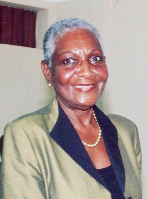–marks first year of existence
The Guyana National Faith and HIV Coalition, which comprises the Hindu, Bahai, Rastafarian, Muslim and Christian faiths, held its first anniversary celebration which although poorly attended saw the recommitting of those present to the fight against HIV.

The anniversary celebration, held at the Theatre Guild was a three-hour event which saw presentations from representatives of all five religious faiths.
Delivering the feature address, Head of the National AIDS Programme Secretariat (NAPS) Dr Shanti Singh, noted that behavioural change is an important aspect of the HIV fight but it is difficult to effect and called for continuous education in which faith-based organisations must play an important role. She pointed out that the last census done in Guyana found that 95% of the country’s population belonged to some religious group and as such the ideal opportunity is presented for the education process on HIV to start in these groups.
She told those gathered that as leaders they have an obligation to the young people in their groups and they should start working with the children at an early age. She told them it is their mandate to help the country’s young people and they must ensure that they get the support they are so in need of.
Meanwhile, PAHO/WHO Representative in Guyana and Chairperson of the UN Theme Group on AIDS in Guyana Dr Kathleen Israel, in her remarks said the coalition exemplifies the commitment to place human rights at the centre of the HIV struggle while striving for universal access to goods, quality HIV prevention, treatment, care and support.
“The fact that faith leaders, from differing faiths, can unite to recognise the importance of addressing HIV, and the need to address the stigma and discrimination that is associated with this infection, also embodies this year’s Human Rights Day theme of ‘Embracing Diversity and Ending Discrimination’,” Dr Israel said.
She urged the coalition to move beyond the commitment and into action and to define the group with a truly national face, one that is immediately recognisable across the country.
Further, she said it is important for the coalition to use the power of its collective faith to advocate for a change in the attitudes and behaviours of members and for the removal of punitive laws and policies that encourage discrimination and hinder the movement towards universal access.
“You represent every aspect of the social ladder of Guyana and the influence you wield is second to none. People define their values as set by you, and the moral fabric of Guyana is weaved with your influence and authority,” Israel told those present.
Both speakers expressed disappointment at the poor turnout at the celebration.
While the faith leaders were meeting since December 2007 the organisation was actually born out of the Guyana National Conference on faith and HIV on December 10 last year at the International Convention Centre, Liliendaal, That conference was a collaborative effort between NAPS and the Joint United Nations Programme on HIV/AIDS(UNAIDS). Participants had gathered to discuss how to implement 11 recommendations that were decided on at a meeting of faith leaders earlier that year. Two of the main recommendations coming out of that roundtable discussion were that faith leaders needed to make themselves and councils more approachable and that measures other than abstinence and discipline needed to be promoted, since they were not the only solutions. Further, the recommendations also called for faith leaders and each faith to discuss HIV-related stigma and discrimination.





